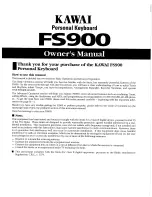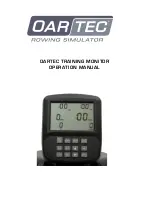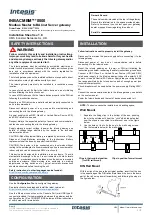
KARMA GE guide
928
Octaves-Random Factor
[–99…+99]
Controls the shape of the weighting curve being
applied to the bottom part of the CC Pattern Grid
(Octaves).
For more information, see “Rhythm Group” on
page 909 and “Pools-Random Factor” on page 911.
This is valid only if the GE settings make the Phase
2 CC pattern specify Pitch Offset values.
Octaves-Weighting Curve
[0…3]
Chooses a weighting curve shape for the bottom part
of the CC Pattern Grid (Octaves).
For more information, see “Rhythm Group” on
page 909, “Pools-Weighting Curve” on page 911, and
“Random Weighting Curves” on page 961.
This is valid only if the GE settings make the Phase
2 CC pattern specify Pitch Offset values.
Global Parameters
CC-A
[–1…126]
CC-B
[–1…126]
Selects one of the supported Control Change messages,
in addition to
126: Pitch Bend
.
Note:
CC-A and CC-B may be generated
simultaneously, with the same or different values, in
alternation, and other variations depending on internal
settings of the GE.
Even if CC-A or CC-B are properly activated, you
may not be hearing any effects if the “Transmitted
MIDI Filter: “CC-A/CC-B” parameters (“CC–
A/CC–B” on page 101) have been set to filter out
the data that KARMA is generating.
Associated Parameters
Cluster Mode
[0, 1]
0: Single-1 Step Per Cluster
Each time a note, cluster of notes, or group of drum
notes is generated one CC Pattern Value will be chosen
for the current step, after which the CC Pattern
advances to the next value. For example, a cluster of 6
notes will be generated with a single CC value
preceding it, and advance the pattern by 1 to the next
step.
1: Multi-1 Step For Each Note In Cluster
For every note in a cluster or group of drum notes
generated simultaneously, a separate CC Pattern Value
will be chosen after which the CC Pattern advances to
the next value. For example, a cluster of 6 notes will be
generated with each note preceded by the next 6 CC
values indicated by the pattern, with a net advance of 6
steps. This means that each note in a cluster or each
note of a drum pattern that is generated
simultaneously can be given its own CC value - but
only if your synth supports this type of behavior.
This will also affect the “Note Number” Pattern Type
options. If
0: Single
, a cluster of notes will be preceded
by one CC value according to the pitch of the first note;
if
1: Multi
, each note will get a corresponding CC
value. For example, if generating pan data, this can be
used to pan each note of a cluster across the selected
range according to its pitch (but only if your synth
supports this type of behavior).
When the “GE Type” (“GE Type” on page 897) is
1:
Generated-Gated
, the number of notes being
generated is considered the Cluster Size.
When the “GE Type” is
0: Generated-Riff
, setting
this to
1: Multi
will have no effect unless there is a
Cluster Pattern containing values of more than just
1.
When the “GE Type” is
2: Generated-Drum
, setting
this to
1: Multi
will have no effect unless at least one
Drum Pattern has the “[c] (clusters)” button turned on
in the Phase Pattern and there is a Cluster Pattern
containing values of more than just 1, or more than one
drum note is being generated at a time (by using more
than one Drum Pattern, or by using a single Drum
Pattern in “Poly” mode).
Pitch Offsets On/Off
[0, 1]
When On: 1, the Pitch Offset pattern specified by the
Phase 2 CC Pattern grid is applied as transpose values
to notes as they are generated. This allows the effect of
the pattern to be switched on and off in realtime. This
will not have any effect unless internal settings of the
GE specify that Pitch Offsets are being used.
P.Offset Chord Shift
[0…2]
0: Off
The Pitch Offsets are applied with no further
modification from this setting.
1: Scalic1
Chord analysis is performed on the input source
material, and as the Pitch Offset values are applied to
transpose the generated notes, notes that may be
“atonal” based on the analyzed chord are shifted to
tonal notes. Useful for creating complex chromatic
0: Exponential
2: Exp-S
1: Logarithmic
3: Log-S
-1: Off
96…125: [N/A]
0…95: CC#00…CC#95
126: Pitch Bend
1: Multi-1 Step For Each Note In Cluster
0: Off
1: On
0: Off
1: Scalic1
2: Scalic2
Summary of Contents for Electronic Keyboard
Page 1: ...Parameter Guide Parameter Guide ...
Page 2: ......
Page 180: ...Program mode EXi 170 ...
Page 290: ...EXi STR 1 Plucked String 280 ...
Page 572: ...Sequencer mode 562 ...
Page 700: ...Global mode 690 ...
Page 751: ...Insert Effects IFX1 IFX12 Routing 741 Fig 2 3a Fig 2 3b ...
Page 902: ...Effect Guide 892 ...
















































